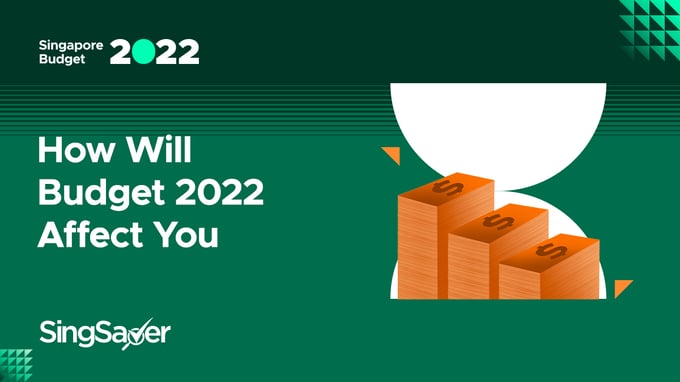Budget 2022 was a lot to digest. But here’s the gist of the major developments and changes, and how those will affect you.
Spanning various categories and sectors, Budget 2022 introduced multiple key changes and developments that will impact the daily lives of Singaporeans, from the cost of living to subsidies and job availability.
If you think the Budget is all about the freebies to expect from the Government, have another think. The policies implemented will have far-reaching effects that will impact the future of Singapore and its socioeconomic landscape.
Here’s what you need to know.
#1 GST hike & GST offset measures
Everyone has been expecting the GST to increase from 7% to 9% as briefly announced before Budget 2022, but more details were finally shared during Budget 2022.
To ease Singaporeans into the impending GST hike, the measure will be rolled out in two phases:
- The first increase from 7% to 8% will happen on 1 Jan 2023
- The second increase from 8% to 9% will happen on 1 Jan 2024
This GST hike is intended to support Singapore’s increased healthcare expenditure in preparation for an ageing population, as well as to take care of the current senior population. The Government will absorb the GST on publicly-subsidised healthcare and education.
GST offset measures
- No increase in government fees and charges for one year from 1 Jan 2023
- Extra S$640m added to the S$6 billion Assurance Package
- All adult Singaporeans to receive up to S$1,600 in cash
- Eligible households to get S$330 to S$570 extra U-Save rebates over the next four years
- Lower-income seniors are also eligible for extra payments totalling up to S$900
- Singaporean households to receive a total S$400 CDC vouchers over 2023 and 2024
- All Singaporean children and seniors will receive MediSave top-ups totalling S$450
#2 Household Support Package
To help Singaporeans with their living expenses, bills, daily essentials and their children’s education expenses, a S$560million Household Support Package comprising the following will be rolled out:
- GST U-Save Voucher: GST Voucher-U-Save rebates will be doubled for the rest of the year. Eligible HDB households will receive additional rebates of up to S$285
- Additional top-up to CDA/EduSave/PSEA: Children under 21 years will receive S$200 each in their Child Development Account, Edusave Account or Post-Secondary Education Account on top of Edusave top-ups. Around 790,000 children will stand to benefit from this top-up
- Additional CDC vouchers: S$100 additional CDC vouchers for all Singaporean households. The vouchers can be used at participating heartland shops and hawkers
#3 Wealth tax raised for top-tier earners, high-end properties and luxury cars
The rich and wealthy will be subject to more taxes in the near future to help mitigate social inequalities and ‘recirculate’ a fraction of the wealth stock into Singapore’s economy. According to Finance Minister Lawrence Wong, “Those who earn more, contribute more”.
Personal income tax from Year of Assessment 2024
- Those earning more than S$500,000: 23%
- Those earning more than S$1 million: 24%
This is up from the current 22% tax levied on chargeable income in excess of $320,000.
Property tax
Property tax rates for non-owner-occupied residential properties —such as investment properties— will be increased from 10% - 20% to 12% - 36%.
For owner-occupied properties, the property tax rates for the portion of annual value in excess of S$30,000 will go up from 4% - 6% to 6% - 32%.
This increase will impact the top 7% of owner-occupied residential properties, such as private properties located in central Singapore and large landed properties. Needless to say, owners of properties at the top end will experience steeper tax increases.
Additional levy on luxury cars
To make Singapore’s vehicle tax system more progressive, the government will start levying higher taxes on luxury cars.
If you’re gunning for a car above S$80,000 in open market value —such as the BMW X5 xDrive40i or Bentley Flying Spur— expect to be slapped with a new Additional Registration Fee (ARF) tier at a rate of 220%, up from 180%!
The new ARF rates will be applicable to all cars registered with COEs obtained from the second COE bidding round this month.
#4 Carbon taxes, electric vehicle charging points and more
While the current carbon tax (S$5 per tonne of emissions) will remain unchanged until 2023, the government will be raising this from 2024 onwards in line with the slew of green initiatives announced in Budget 2022.
Here’s a quick recap of what’s to come in order for Singapore to attain its new target of reaching net-zero carbon emissions “by or around mid-century”:
- 2024 & 2025: S$25 per tonne of emissions
- 2026 & 2027: S$45 per tonne of emissions
- By 2030: S$50 to $80 per tonne of emissions
Singapore’s other green initiatives
- Accelerate the adoption of electric vehicles (EVs)
- More EV charging points to be built nearer to where people live
- More green bonds to be issued to fund public sector green infrastructure projects
Even though Singapore is working towards becoming a car-lite city by introducing cleaner, more efficient public transport options, the Singapore government is all for the idea for potential car buyers to opt for EVs over traditional cars.
All in all, consumers, businesses and the government will all have a part to play in moving towards a net-zero carbon emissions world.
#5 CPF Basic Retirement Sum to increase 3.5% annually for next five years
The CPF Basic Retirement Sum (BRS) will increase by 3.5% each year for the next five cohorts turning 55 from 2023 to 2027. This is to account for long-term inflation and possibly even improvements in one’s standard of living.
With the announced increase, CPF members who set aside the BRS when they turn 55 in 2027 will receive payouts of approximately S$1,000 per month the moment they turn 65. This will continue for the rest of their lives.
If you don’t already know, the BRS offers CPF members monthly retirement payouts to help cover their basic living expenses. This provides CPF members in their golden years with greater peace of mind.
On a side note, the employer and employee CPF contribution rates for workers aged between 55 and 70 will also continue to rise. These will see a total increase of three to four percentage points over 2022 to 2024.
Motivated to boost your retirement nest egg during your working years? Consider investing regularly to grow your wealth.
#6 Support for lower-wage workers
Progressive Wage Credit Scheme (PWCS)
To offer transitional support to businesses as measures to increase the pay of the bottom 20% of income earners are rolled out, the newly announced Progressive Wage Credit Scheme (PWCS) will co-fund wage increases for low-wage workers.
Designed to uplift lower-wage workers earning up to S$2,500, the PWCS will co-fund 50% of wage increases made this year, and 30% of those made in 2024 and 2025.
An initial S$2 billion injection will be devoted to fund this scheme over the next five years.
Workfare Income Supplement
The enhanced Workfare scheme aims to benefit more than 500,000 workers in our workforce.
The qualifying income cap for Workfare Income Supplement will be increased from the current S$2,300 to S$2,500 per month from 1 Jan 2023, allowing more lower-wage workers to benefit from Workfare Income Supplement.
The minimum age to qualify will be lowered from the current 35 to 30, and a minimum income criteria for Workfare will be set at S$500 per month to encourage part-timers and casual workers to take up full-time work. For younger workers aged 30 to 34, the maximum payout will be S$2,100.
These are the maximum annual payouts for other age groups:
- Aged 35 to 44: Increase to S$3,000
- Aged 45 to 59: Increase to S$3,600
- Aged 60 and above: Increase to S$4,200
Those with disabilities will receive a maximum payout of S$4,200 annually, regardless of age.
Progressive Wage Model
The Progressive Wage Model will be extended to workers in the retail, food services and waste management sectors over the next two years, as well as to in-house cleaners, security officers, landscape workers, administrators and drivers across all sectors. This was recommended by the Tripartite Workgroup on Lower-Wage Workers.
Companies that employ foreign workers will be required to pay their local employees the local qualifying salary (currently set at S$1,400 per month).
In conclusion
As we chart our new way forward together as one united people, you’re probably relieved to know that the anticipated broad-based GST hike has been delayed to 2023.
Even though more support will be provided for households, businesses and lower-wage workers alike, you should still be prudent with your money. For a start, consider using credit cards that can help you save money on your day-to-day purchases!
Read these next:
Singapore Budget 2022: Key Highlights And Summary
Singapore Budget 2022: GST Hike — Increase in GST And Packages To Offload The Financial Burden
Singapore Budget 2022: 4 Small Sacrifices You Can Make to Defray the Upcoming GST Hike
Singapore Budget 2022: 6 Things You Didn’t Know You Could Spend Your CDC Vouchers On
Singapore Budget 2022: How Rich Must You Be To Be Affected By Wealth Tax?
Similar articles
How Singapore Budget 2020 Affects HDB, CPF & Living Costs
Singapore Wealth Tax: How Rich Must You Be To Be Affected?
Singapore Budget 2020: Summary And Key Highlights
Column: Can Taxes Make You Thinner?
Singapore Budget 2021: Key Highlights And Summary
Singapore Budget 2022: Key Highlights And Summary
Additional S$1.4 Billion Boost to Assurance Package to Cope With Inflation & GST Hike
Singapore Budget 2022: GST Hike — Increase in GST And Packages To Offload The Financial Burden










